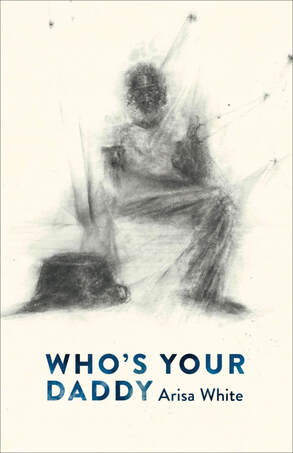If coming-of-age stories are your preference, but you’re looking for a new twist on the genre, then look no further than Arisa White’s latest title Who’s Your Daddy. This poetic memoir presents a modern take on growing up, from adolescence to adulthood. Arisa White’s story told through narrative poems gives readers a taste of living under an unjust set of fathers. But it’s not all doom and gloom as Arisa interjects a style of humor that complements her own sensibilities. Even though readers are meant to view this story through the perspective of a young Black Guyanese girl, anyone who has had an unfavorable relationship with a parental figure can find value in White’s collection. The opening prologue begins with Arisa White’s recollection of her relationship with her father. There is a dark undertone that is firmly established in the opening prologue, which sets this disturbing quality for the remainder of the story: “She never heard his ‘I love you.’ Cheated with a white woman, gambled away and didn’t pay taxes on the family house…” (9). The idea of this father figure contributes to many of the themes and subtext within White’s story, which clearly had an effect on her upbringing as a child. The cheating, the gambling, the torn ragged clothes, it all plays a vital role in the overall narrative that each section builds upon. The prologue welcomes readers into a world of grief that serves as the fundamental challenge interfering with Arisa, who is nothing but a young adolescent looking to live her life. “She never heard his ‘I love you.’ Cheated with a white woman, gambled away and didn’t pay taxes on the family house…” A key element of this memoir is the sharp dichotomy between characters in the past and present. Who’s Your Daddy begins with the “Prologue” before shifting to “My mother is nineteen.” This first narrative is about the first encounter shared between Arisa’s mother and Gerald (aka her father), who is depicted here as attractive and charming, but most importantly, kind. White intentionally contrasts the stained image that was previously delivered to the reader: “Handsome, tall, good healthy teeth, dressed sharp and debonair, he could steal the room” (13). Even though there is an expectation of immorality, it’s not quite at that level just yet. Gerald actually seems like an upstanding man who can grant this mother and her children the fairytale life that they deserve. However at the end of the section, it’s revealed that Gerald is married and likely won’t play an integral role in the life of her mother’s recently born child (Arisa). Each story within Who’s Your Daddy shows much of the helplessness of her childhood and the despair that turns to acceptance and perseverance. White sums it up best: “We can’t have nice things, and somehow we, the children, are to blame” (32). It’s a cruel and unjust world that Arisa White presents, where the lack of a parental figure plays into the psychology and development of a child from birth to early adulthood. This is a key life factor that cannot be replicated or replaced, but to see exactly what kind of person will come out on the other side, which in this case is a strong and talented adult woman. “We can’t have nice things, and somehow we, the children, are to blame" Who’s Your Daddy is a truly personal journey that will leave a unique impression on everyone. There is a slow-burn quality to White’s storytelling, but once her arc is set into high gear, readers won’t be able to stop turning the page. White’s story is raw and honest not only in the words on the page, but the lyrical construction of the prose poetry in each chapter. The ending culminates in a beautiful reflection on White’s birth in the back of her father’s Cadillac and her mother’s initial fairytale romance with her father. This is a memoir that will leave all people hoping for an ideal future filled with love and attention for all future generations of children and adolescents.
0 Comments
Leave a Reply. |
Archives
July 2024
Categories
All
|
|
Glassworks is a publication of Rowan University's Master of Arts in Writing 260 Victoria Street • Glassboro, New Jersey 08028 [email protected] |
All Content on this Site (c) 2024 Glassworks
|


 RSS Feed
RSS Feed
